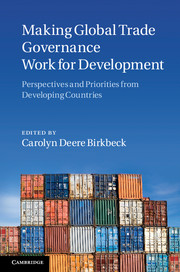 Making Global Trade Governance Work for Development
Making Global Trade Governance Work for Development from Part II - Roles and responsibilities in global trade governance: diversity in developing country priorities and strategies
Published online by Cambridge University Press: 07 September 2011
The Doha Development Agenda (DDA) – the first trade round to be negotiated under the umbrella of the World Trade Organization (WTO), and the ninth in the post-war multilateral trading system – has been dogged by recurrent deadlock. But the stasis surrounding the Doha negotiations should not be mistaken for stasis in the WTO. The world that the WTO was created to govern has been changing rapidly, and, unlike many other international organizations, the WTO has proved unusually responsive to these changes. The most important has been the shift in the economic balance of power, with the emergence of the new powers that have come to be popularly known as the BRICs. Unlike other organizations, such as the International Monetary Fund (IMF), the World Bank or the United Nations (UN) Security Council, that have been slow to adapt their decision-making structures to reflect these ground-level changes, the WTO has welcomed Brazil, India and China (the BICs) into the core of its decision-making. Moreover, many of these institutional changes within the organization are not a knee-jerk reaction to the financial and economic crisis, but predate it. As a result, the WTO today looks quite different from the ‘rich man’s club’ of the General Agreement on Tariffs and Trade (GATT), which was dominated by the old Quad (the European Union (EU), the United States (USA), Canada and Japan). Interestingly, however, this ability of the WTO to adapt to changing external imperatives has generated mixed results. In this article, I address the question: What impact has the emergence of the new powers of the BICs had on the WTO?
To save this book to your Kindle, first ensure no-reply@cambridge.org is added to your Approved Personal Document E-mail List under your Personal Document Settings on the Manage Your Content and Devices page of your Amazon account. Then enter the ‘name’ part of your Kindle email address below. Find out more about saving to your Kindle.
Note you can select to save to either the @free.kindle.com or @kindle.com variations. ‘@free.kindle.com’ emails are free but can only be saved to your device when it is connected to wi-fi. ‘@kindle.com’ emails can be delivered even when you are not connected to wi-fi, but note that service fees apply.
Find out more about the Kindle Personal Document Service.
To save content items to your account, please confirm that you agree to abide by our usage policies. If this is the first time you use this feature, you will be asked to authorise Cambridge Core to connect with your account. Find out more about saving content to Dropbox.
To save content items to your account, please confirm that you agree to abide by our usage policies. If this is the first time you use this feature, you will be asked to authorise Cambridge Core to connect with your account. Find out more about saving content to Google Drive.